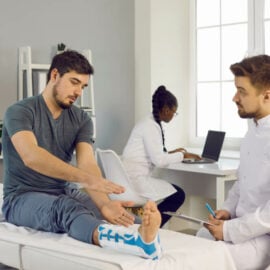
When you suffer a work-related injury and are forced to miss work, your initial concerns are likely to be how you’ll cover your medical treatment and your monthly bills. If you have been injured in a workplace accident, you should qualify for workers’ compensation benefits through your employer. Workers’ compensation pays for medical care and provides partial replacement of your monthly income.
You may wonder whether a settlement is available for the pain and suffering you experienced because of your injury. Unfortunately, workers’ compensation insurance does not cover pain and suffering in the traditional sense. But you still may have some options including permanent partial disability benefits for certain injuries that cause ongoing impairment.
You need a knowledgeable and compassionate work injury lawyer to evaluate your workplace accident and injuries and walk you through your legal options. Our attorneys at Heller, Maas, Moro & Magill Co., LPA, stand up for injured workers throughout Northeastern Ohio. Our goal is to help clients obtain the maximum compensation available by law. We truly care about our clients and helping them move past serious injuries.
Contact us today for a free initial case evaluation. One of our experienced Ohio work injury attorneys can discuss the kinds of benefits available and how our firm can help you secure the full benefits that Ohio law promises.
Contents
How Is Pain and Suffering Defined Under Workers’ Compensation
“Pain and suffering” is normally defined as the physical pain and emotional distress caused by an injury. Pain and suffering can also encompass depression, anxiety, sadness, and humiliation resulting from your injuries. Payment for pain and suffering is usually sought as part of a personal injury lawsuit. But injured workers are generally barred from suing their employers after a workplace accident when workers’ compensation is available.
Workers’ compensation is intended to streamline the process an injured worker must go through to get medical treatment and financial benefits after suffering an injury at work. Workers’ compensation eliminates the need for an injured worker to prove their employer’s negligence or legal fault for a work injury.
Instead, workers’ compensation is considered a no-fault system. An injured employee of a business is entitled to benefits for any injury that occurs in the course and scope of his or her employment. Workers’ compensation provides certain defined benefits, including necessary medical treatment and calculated wage replacement payments.
However, in exchange for these guaranteed benefits, an employee gives up their right to pursue a personal injury claim, except under limited circumstances. That means an injured worker normally cannot recover financial compensation for the pain and suffering they endure due to a work injury.
Your Pain and Suffering Recovery Options
Despite the general prohibition on recovering money for pain and compensation through the workers’ compensation system following a work injury, you still may have options for seeking a recovery for pain and suffering caused by a work injury.
Injured employees may be entitled to step outside of the workers’ comp system and file a personal injury claim against their employer in special circumstances if the employer’s intentional actions caused a worker’s injury. If an employer intentionally allowed a worker to work in work conditions that the employer knew were unsafe and a worker was subsequently injured, for example, that injured worker may be entitled to pursue a traditional personal injury lawsuit.
Workers’ compensation benefits may be available to help treat physical pain and distress caused by a work injury. For example, prescription pain medication or other medical procedures to relieve pain caused by an injury or treatment may be considered necessary treatment that is covered by workers’ comp. Treatment for other physical or mental health effects that result from a work injury may also fall within the reasonable and necessary treatment covered by workers’ comp.
Certain categories of workers also fall outside the state workers’ compensation system, including railroad workers and maritime vessel crewmembers, who are instead covered by federal laws that govern their rights to seek compensation from their employers for a work injury.
Finally, depending on the circumstances of your work injury, you may be entitled to file a personal injury claim against a third party. For example, if your work injury occurred in a motor vehicle accident caused by a negligent driver, you may file a car accident injury claim against the at-fault driver seeking compensation for your injuries including for pain and suffering. If you were hurt in a workplace accident caused by a defective piece of equipment or machinery, you may be entitled to file a product liability claim against the manufacturer of the equipment or machinery.
Which Option Is Right for You?
Even if you may be entitled to file a personal injury claim against a third party, there are factors to be considered before deciding to do so.
If you file a workers’ compensation claim and receive benefits, and also file a third-party personal injury claim and recover compensation from an at-fault party, your employer or its workers’ compensation insurer may be entitled to reimbursement for some or all the workers’ comp benefits paid to you.
When Should You Seek Legal Help for a Work Injury?
You should have a work injury lawyer evaluate the options available to you if a work injury has left you with serious pain or emotional distress. There are strict deadlines for filing workers’ compensation claims with the Ohio Bureau of Workers’ Compensation. If there are other avenues for you to seek a financial recovery outside the workers’ compensation system, you only have a limited amount of time in which to act.
An expert injury attorney at Heller, Maas, Moro & Magill Co., LPA can discuss your legal rights and offer guidance about the proper steps to take during a free consultation. The sooner you obtain legal representation, the better chance your attorney has to preserve evidence and information that may prove critical to recovering compensation.
If you’ve suffered a work injury and have questions about your rights to compensation, contact Heller, Maas, Moro & Magill Co., LPA, today for a free, no-obligation consultation with a knowledgeable work injury attorney. Don’t wait to explore your legal options for maximizing your financial recovery after suffering a work injury.
